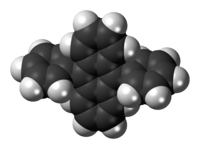9,10-Diphenylanthracene
 | |
 | |
| Names | |
|---|---|
| IUPAC name
9,10-Diphenylanthracene | |
| Identifiers | |
| 3D model (JSmol) |
|
| Abbreviations | DPA |
| ChemSpider | |
| ECHA InfoCard | 100.014.641 |
| |
| |
| Properties | |
| C26H18 | |
| Molar mass | 330.42 |
| Appearance | Yellow powder |
| Density | 1.22 g/cm3[1] |
| Melting point | 248 to 250 °C (478 to 482 °F; 521 to 523 K) |
| Except where otherwise noted, data are given for materials in their standard state (at 25 °C [77 °F], 100 kPa). | |
| | |
| Infobox references | |
9,10-Diphenylanthracene is a polycyclic aromatic hydrocarbon. It has the appearance of a slightly yellow powder. 9,10-Diphenylanthracene is used as a sensitiser in chemiluminescence. In lightsticks it is used to produce blue light. It is a molecular organic semiconductor, used in blue OLEDs and OLED-based displays.
See also
- 2-Chloro-9,10-diphenylanthracene, a chlorinated derivative
References
- ↑ Adams JM, Ramdas S (1979). "The Crystal Structure of Solution-Grown 9,10-Diphenylanthracene. A Combined Computational and X-Ray Study". Acta Crystallographica Section B. 35 (3): 679–683. doi:10.1107/s0567740879004428.
External links
- Polycyclic aromatic hydrocarbons, Australian National Pollutant Inventory
This article is issued from
Wikipedia.
The text is licensed under Creative Commons - Attribution - Sharealike.
Additional terms may apply for the media files.